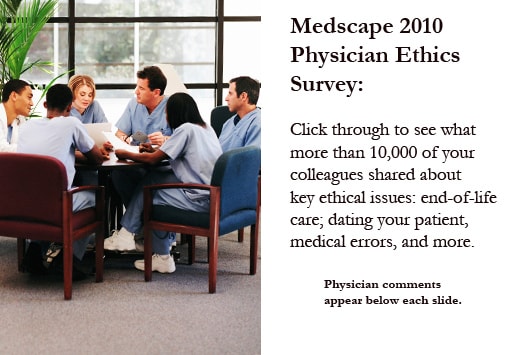
"I once had a terminal patient who wanted to see his granddaughter before he died, so I prolonged his intravenous therapy for 3 days until she arrived. He died the same night."
"Some families have completely unrealistic expectations, despite my educational efforts. I would give continued care, but not happily."
"I do not have the right to determine futile unless the patient is brain dead. Futility is a matter of opinion. We all will die eventually."
"I would not recommend it if I thought it was futile, but I would give it if that is what the patient or the family wanted."
"Why waste money and time when results are nil?"
"I would do this if I felt it would give the family time to accept the inevitability of death."

What was your biggest ethical dilemma?
• Reporting an incompetent or impaired colleague
• Owning up after making a medical error
• Physician/patient confidentiality when one half of a couple is HIV positive and the other half doesn't know
• Prolonging futile care for a dying patient
• Denying care to a nonpaying patient
• Whether to honor a family's request not to tell a relative that he/she has a terminal illness
• Exaggerating a patient's condition to get insurance coverage
• Writing a prescription for a family member or friend
"I do not participate in active withdrawal of such intrinsic life-sustaining needs. The family could find another physician if they feel so strongly."
"It depends on what you mean by 'premature.' I would feel differently if death is imminent and there's no hope, and the quality of life is poor rather than if there's no hope but some quality, or if there is some hope but the quality of life is lousy. I'd always try to think, what would the patient want."
"Not if the family insisted, but if the patient insisted on it, I would."
"This is why hospitals have ethics boards. I would refer cases like these to experts."

"I think we do this all the time, with patients coming in with viral urinary tract infections who want antibiotics because they think it is the only thing that will help them."
"Lying to patients about treatments is never OK."
"I'm experienced enough to know that I can't help everyone, and I'm egosyntonic with being the occasional disappointment to my patients."
"A placebo produces a 30% improvement in some studies."
"Why not save money and risk for adverse effects by just prescribing placebos in cases when medications are clearly not indicated?"

"Pain should not be undertreated, and what's the problem with a terminal patient being addicted and comfortable?"
"Pain is undertreated all the time in my city. There is a great deal of fear of the Drug Enforcement Administration and reluctance to use narcotics even when they are indicated. Studies show that addiction is seldom an issue if the pain is real."
"I would never undertreat a patient's genuine pain. I would withhold narcotics from a chronically addicted patient who is presenting with a questionable painful condition (eg, back pain or toothache) and offer nonnarcotic alternatives."
"Having been sanctioned by an out-of-control, vindictive state medical board, such things aren't even in the purview of ethics, but rather a survival mechanism for my ability to continue practicing."

"Most of the time, I tell them exactly as it is; they need to know the truth, and who am I to judge what they should or shouldn't know? However, if the patient is very frail emotionally and physically and has a very supportive family, I may not."
"It's not about hiding information. It's learning how to talk to patients and giving bad news in the best way possible. All the information should be given, but any positive that exists should be also talked about."
"The truth, delivered with compassion, is a gift."
"I think patients deserve total honesty from their physician. They want to know."
"An elderly patient who is senile will not understand, benefit, or prepare, so it is senseless to inform them. However, a family member, next of kin, or whoever is the health proxy will be notified."

"Cover-ups are never OK."
"Everyone makes mistakes, but physicians are punished for their mistakes. I don't believe in covering up information, but in today's litigious society, a simple mistake could cost a physician his or her license."
"The more open the physician is about mistakes, the more acceptable mistakes will be to the patients."
"Why make a mountain out of a molehill if it will cause the patient more emotional upset than simply not saying anything, as long as no physical harm has occurred?"
"Do I balance the potential harm to a patient vs the potential harm to myself in publicly announcing 'a mistake'? Yes."
"I own up to all mistakes I make, but I explain their impact or lack thereof."

"I would, but I would contact an attorney first."
"Yes, but I would tend to seek out advice from a risk manager or more seasoned physician for help in how to reveal the mistake."
"I will reveal any mistakes, especially those that could harm a patient. That is the morally correct thing to do."
"We take an oath to do no harm. Covering up is a form of lying."
"If revealing the mistake won't change the management and it has not yet caused any harm, I think a wait-and-see approach is OK."

"Often, defensive medicine is sloppy medicine. A chart note explaining care is often a better defense."
"Some patients want reassurance, and in some cases, testing helps to prevent further unnecessary medical care."
"Yes, it's acceptable: A jury of 12 men will always be found by an enterprising trial lawyer that will find you guilty of not doing all you could have done."
"We must get away from 'I-did-this-to-protect-myself' medicine. It is costly and exposes the patient to added, unnecessary risks."
"I consider it a criminal act."

"A competent patient who has been adequately medically informed and has a terminal condition that makes his or her life miserable with no chance of cure or amelioration should be allowed to look into all options. We may not agree with it, but we have no right to legislate anyone into intractable suffering."
"Palliative care is one thing, but suicide is not within the scope of acceptable physician behavior."
"I do not believe in assisted suicide, but I do believe in withdrawal of support. If the patient is terminally ill and suffering and there is absolutely no hope to survive, then I withdraw the support (eg, antibiotic treatment, blood testing, or transfusions)."
"I'd want it for me when the need arises."
"Assisted suicide is murder."

"As a profession, medicine cannot allow those who are impaired by any reason to expose patients to danger."
"I would not report him to the board, but I would consider talking to a superior. The board is not designed to help, rather to punish and demonstrate their 'value.'"
"I would like to think I would, but it has happened when I did and didn't."
"I would, but only after firm warning that this is my intent and after multiple discussions with this impaired colleague."
"I have done so and consider it an act of love. A year after having done so, the physician and spouse both thanked me."
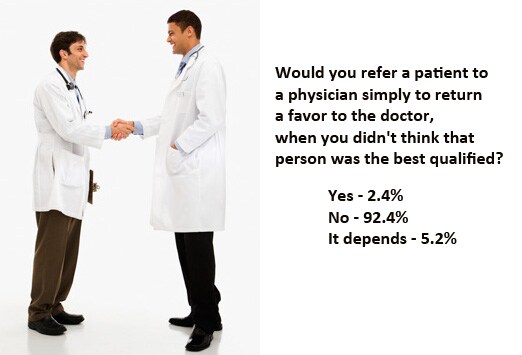
"That is inexcusable."
"I would never send a patient to someone I would not go to myself or send my family to. My attitude has made me unpopular with some local MDs."
"Yes, if it is a very minor problem, and I know the physician is capable of taking care of uncomplicated issues."
"It depends on what you mean by 'best qualified.' Sometimes it's a balance between compassion and expertise, not just expertise alone."

"I would feel conflicted, but I need to survive as a business."
"There is a duty to serve and a responsibility to remain fiscally solvent that need to be balanced."
"I would fight for higher reimbursement and make clear to the patient that I was doing this because of my ethical obligation, and I would ask them to complain to their human resources department."
"I am currently in that situation but refuse to drop any patients."
"It cannot be just or mostly about the money. We must recall that we went into medicine to help people. I would feel I was abandoning my patients if I dropped the insurers."
"I wouldn't want to punish my patients because of a greedy, poorly run insurance company, but I would feel conflicted, because by not dropping them I am in effect condoning their actions."
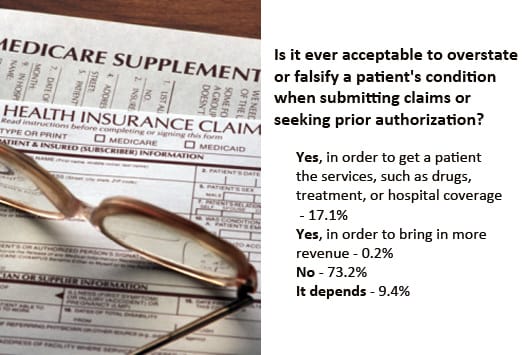
"Sadly, in this stage of health insurance, sometimes we need to do what we need to do on the patients' behalf."
"Falsifying anything is unethical and illegal, regardless of the situation."
"It is acceptable when a medically justifiable goal is sought and especially when confronted with an arbitrary claims denial, which is a bureaucratic, economically motivated denial."
"This is called fraud, but unfortunately it may be necessary for MDs to commit it for the benefit of the patient (and not the physician)."
"This widely practiced practice is bankrupting the system."
"It's not okay to falsify, but maybe to exaggerate."
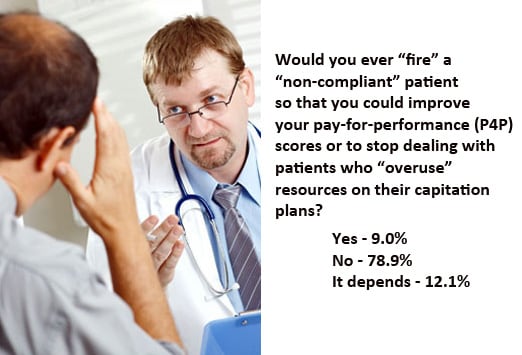
"This would definitely seem unethical."
"I would only consider 'firing' the patient for repeated episodes of noncompliance."
"I don't agree with P4P for precisely this reason. However, if I am forced into P4P, as I am, I must deal with it. Should my practice go out of business, and all the rest of my compliant patients lose their doctor because someone who doesn't have the desire to keep themselves healthy is bringing the economics of the practice down? I don't think so."
"I would fire a noncompliant patient if the issue affected his or her health care, as I do not have the time or inclination to tolerate people who do not want to help themselves."
"If it got to a point where it began to affect my income in a significant way, I would consider it."
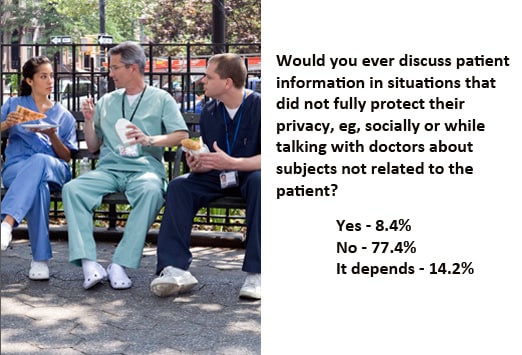
"Not privileged information, but I may tell a story about an interesting case without revealing privileged information -- absolutely. HIPAA (the Health Insurance Portability and Accountability Act) is stupid and antithetical to good medical care. If I had a problem patient and saw a colleague who might be helpful, I would certainly obtain their input. No names mentioned, of course."
"The issue prompting discussion may be more important than the patient's privacy."
"My goal would be to be 100% 'no,' but I'm human and may have done so in the past. I'm on guard about this issue at present."
"It's really hard not to discuss interesting cases with other MDs socially, but I never use any identifying information."
"I'm 'old school' and adhere to the belief that my patient can completely confide in me, much like a priest."
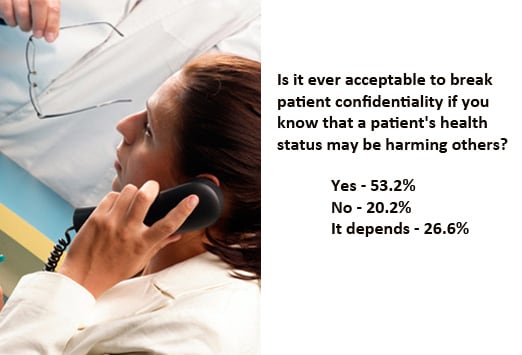
"It is acceptable if the patient is a danger to himself or others."
"As per Mr. Spock, 'The needs of the many outweigh the needs of the few or the one.' This applies in highly specific circumstances, however, and would be the exception, not the rule."
"It would be good to try to convince patient of the right path in a few visits."
"Owing to ethics and HIPAA, I don't believe that it should or can be done. I would certainly attempt to convince the patient to disclose the information to his or her spouse or partner."
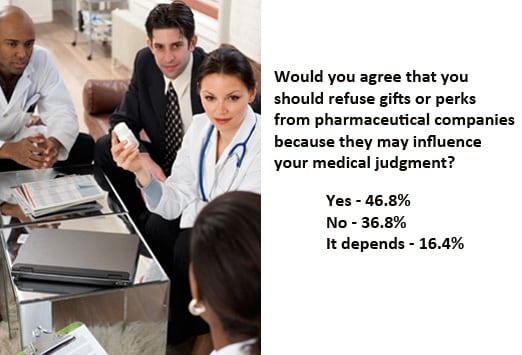
"If by 'gifts' you mean pens, sticky note pads, and the like, my answer is no. If by 'gifts' you mean items of value (eg, expensive pens or outings) then my answer is yes."
"I am not so shallow that I can be bought off by a slice of pizza."
"A company's influence is minimal, because multiple companies provide the same gifts. The companies are also a source of new information on medications and devices."
"Post-It notes and pens do not influence my medical judgment."
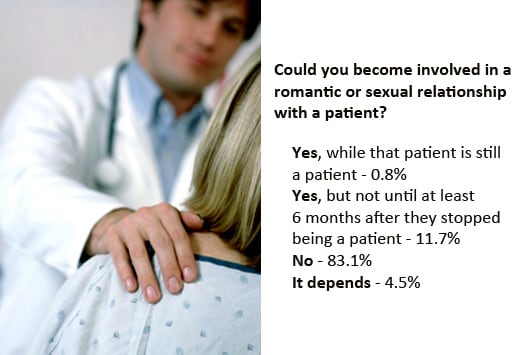
"This depends on specialty. For psychiatry, never. For general surgery, potentially at a time greater than 6 months after the surgery and depending on the nature of the professional relationship."
"We shouldn't remotely entertain romantic thoughts when we see a patient. But it you ran into that person outside the office at a later date and 'clicked,' I see no problem. You've removed the hierarchical difference in position at that point.
I would strictly guard against any entanglement and if I felt tempted would resign as that person's physician."
"It is totally exploitative and wrong."
"I did, and 30 years later, we are together and happy."
"My wife can shoot a tight pattern of .45 caliber handgun rounds into the groin area of a paper target at 15 yards without difficulty."
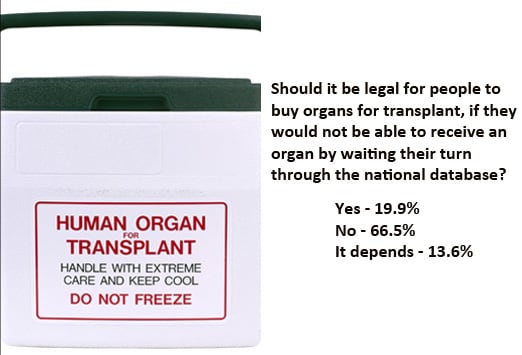
"I'd be inclined to allow it in certain situations, eg, to save the life of a young mother with small children."
"The seller is not objective. The current listing process moves organs to the sickest patient, not the best match. We are wasting too many organs."
"It would make more black-market organs; people should wait in line."
"The ability to pay determines a lot of accessibility to medical care. I'm not sure why organ transplants are different."
"The sale of human body parts is immoral."
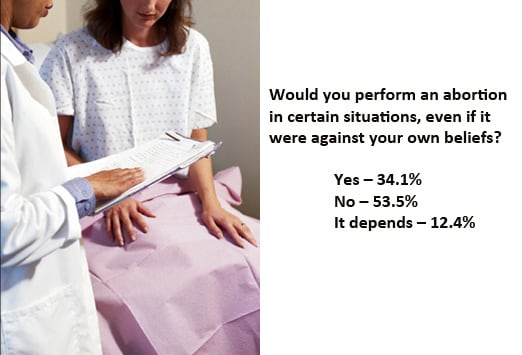
"I accept women's right to abortion but I would never do an abortion."
"If I were against it, I would not perform it; there is something called integrity, you know."
"This is the woman's choice, not the doctor's or the pharmacist's or the politician's."
"The patient should go to someone willing to do it."
"It's about the patient, not about me."
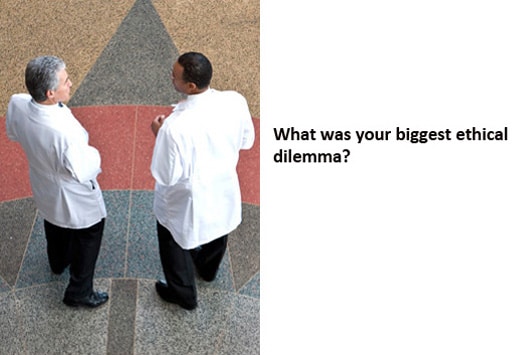
What was your biggest ethical dilemma?
• Reporting an incompetent or impaired colleague
• Owning up after making a medical error
• Physician/patient confidentiality when one half of a couple is HIV positive and the other half doesn't know
• Prolonging futile care for a dying patient
• Denying care to a nonpaying patient
• Whether to honor a family's request not to tell a relative that he/she has a terminal illness
• Exaggerating a patient's condition to get insurance coverage
• Writing a prescription for a family member or friend
http://www.medscape.com/features/slideshow/public/ethical-dilemmas?src=ptalk&uac=151135BK

